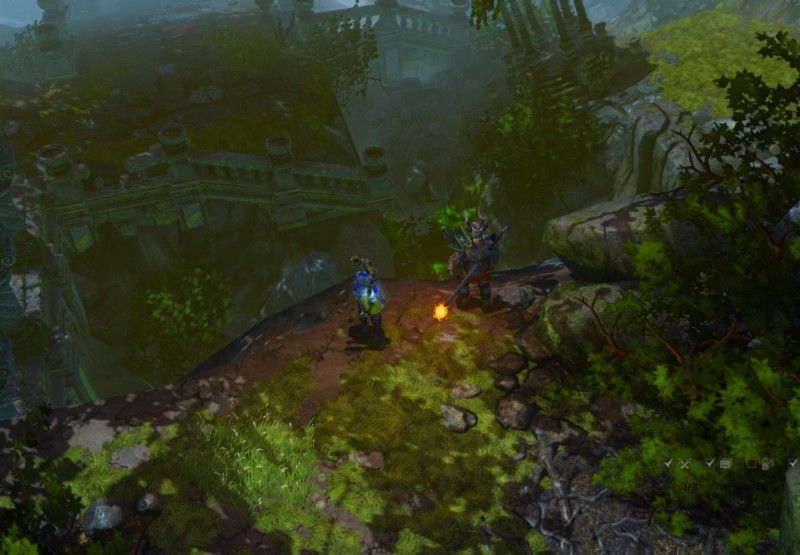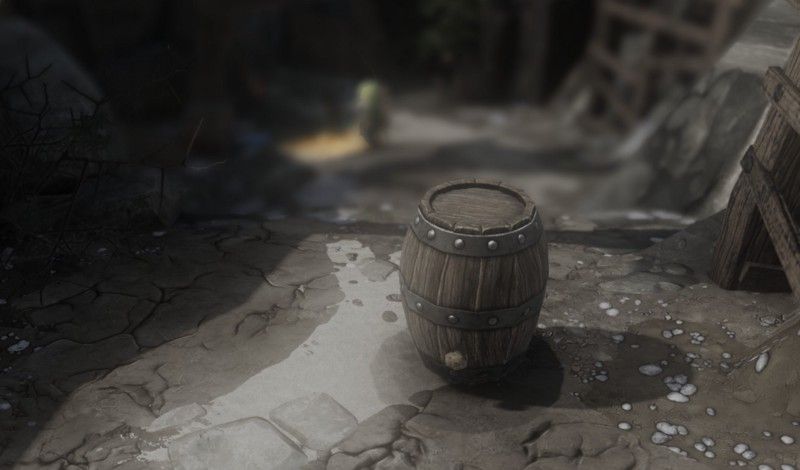Divinity: Original Sin is like a little kid trying to emulate their older sibling. Most of the time it comes off annoyingly cute. But every so often, you have to shake your head and think to yourself, “What the hell are they doing?” The game plays heavily on nostalgia, not just borrowing, but outright stealing elements from old classics. And you know what? It works.
The 90's and early 2000's were a great time for PC gamers, especially if you loved RPGs. Games like the Ultima series, Baldur’s Gate I & II, Planescape, and even the original Neverwinter Nights; Divinity looks up to these games, trying to do everything that made them so great. Sometimes it tries a little too hard. Even so, it’s obvious everything borrowed was given tremendous thought to give you a classic feel of those old games with a little tabletop gameplay thrown into the mix. Even the camera angle and it’s tilt shift effects almost make you feel as if you're playing with digital miniatures. From the the intriguing environment-based puzzles, the classic turn based combat, the humor all comes together for a nostalgic experience, if you're willing to overlook a few potentially game breaking bugs.
But Divinity isn't just some game invoking sentimentality. There are plenty of things that set it apart, but one in particular really caught my eye. The way the elements and environment come into play, both in solving puzzles as well as combat is really what makes this game unique enough to stand on it’s own two legs.

Within the first hour or so I encountered a boat on fire. I can choose to ignore it will eventually burn up, or I can be the hero and help put the fire out. At first there isn't any clear way to smother the flames, until an npc chimes in about wishing it would rain. Coincidentally I did pick up a spell a minute ago that makes it rain. Surprisingly, casting the rain spell on the boat did in fact put the fire out.
It feels weird having to point out such a trivial game mechanic, but words can't express how genuinely excited over this small feat. How often is something like this ever implemented? Think about all the times you were playing something and wished you could have put out a fire with a simple spell, or cleared debris in your way with a fireball. Not only that but spells designed to aid you in getting around the map can be useful in combat.
Every ability feels well planned out, which leads to some incredibly enjoyable combat with plenty of strategy involved. Oil barrels can explode with fire based spells, while electric attacks can shock anyone standing in water. And that’s just the start. Everything feels useful. There are also no ‘cookie cutter’ builds or defined classes. In order to be good at combat, you only need to know what you're doing and be aware of your surroundings. Want to be a fighter who sneaks around and hits things with a giant sword? Or maybe a ranger who talks to animals and hurls fireballs? Go for it. You can of course min/max your stats to your heart’s content, but it also does a good job at allowing you to play how you want without being punished.
As great as Divinity started out, half way through the second area the game began to buckle under it’s own ambitions. Parts felt untested, rushed, and unfinished.
The game is roughly divided into three areas; Cyceal, Silverglen, and Hunter’s Edge, or as I call them: Forest Zone I, II and III. With the exception of a few tombs and a trip to a snow dimension, every area starts feeling identical. It’s kind of a shame when you look at all the individual assets in the game. There’s so much potential for creativity, from sprawling cities to barren deserts. But the game doesn't really utilize any of it. Instead, the maps are given a few scattered houses and campsites in an otherwise pretty, but vacant forests with occasional encounters. On the upside, Divinity is packaged with the same toolkit that was used to build the game itself, so we can hopefully count on some great mods to come from it. Like Cow Simulator.
Speaking of world design, whoever decided to scatter waypoints around the zones to allow for quick travel is my hero. That travel system is probably the sole reason that kept me from quitting out of anger. One of the most frustrating parts of the game is it does not guide you, forcing you to roam aimlessly around for hours with no inclination of your next destination. Some people will tote this around as a “feature”.
“It doesn't hold your hand! It doesn't tell you what you have to do next, just like old RPGs used to. You can go anywhere you want!”
Okay, but even those games would hint at where to go next, or provide multiple ways to accomplish something. In Divinity, you'll be stuck teleporting around the map until you find the right NPC to talk to. You also can't just go anywhere you want. Areas are still gated in a sense, either by encounters a much higher level than you, or requiring specific items to allow you to pass. You may be able to do some side quests out of order, but when you look at the main quest, it’s incredibly linear. Hopefully you also did everything in the right order anyways, so the quest you're on doesn't bug out and prevent you from progressing.
By the time I finished Divinity, I had 7 quests in my logbook that remained incomplete. Not because I didn't want to do them, but because I couldn’t. Near the end, I stumbled upon a quest called “Bellegar’s Maze” in which I was supposed to navigate various AI creatures across a checkered board using a number of switches and items. Yet the items refused to load, no matter what I did. Even going back to a previous saved game didn’t work. A quick search on the developer’s forums revealed I wasn't alone, and no fix was available.
Luckily it was only a side quest and I could give up. Earlier on that wasn't the case, however. Exploring the second zone, Silverglen, I met Frederick, an injured mage who wanted me to get him a blood stone so he could heal himself. He should have been very much alive by the time I met him. Instead, the first two times we met, he was already a corpse. This wouldn't have really been an issue, but it turned out I needed him alive to trigger a quest that would let me into an area that I needed to get to to in order to progress the main story.
This lead to countless hours of confusion to what I was supposed to be doing, resulting in reading walkthroughs and guides, which only lead to frustration, assuming I had done something wrong. Eventually I loaded an old save game, losing almost three hours of progress. This time I was able to get the quest I needed and was able to enter a hidden lair. I must have taken too long though, because by the time I returned, Frederick decided to die on me again. While I never did get to complete the quest, I was able to keep his blood stone for myself, so it wasn't a complete loss.

The Illusion of Choice
While annoying, the various glitches and bugs weren't what prevented me from getting immersed in the story. Rather, it was the fact I would be presented multiple ways to complete a quest, only to be punished when I didn't do exactly what the game wanted.
One of the staples of classic RPG’s has always been the illusion of choice; multiple solutions to solving a single problem. It was the sense that what you did actually mattered, even when it really didn’t. Maybe you chose to go to north instead of west. Maybe you chose to kill the imp instead of save him. Because infinitely branching narratives are impossible in a game, these choices would typically resolve to the same outcome every time.
Like most other RPG’s, the illusion of choice is present in Divinity. Just make sure you choose the option the game wants you to, unless you're a glutton for punishment. What decade-old games did with a moderate level of success, Divinity fails at constantly. Sure, I can choose to turn down that shady proposition someone in town offers, but guess what? Now I’m locked out of a quest line. Not only that, but in order to learn the ability I would have gotten from that quest, I now have to go commit genocide in a small remote village just so I can steal a damn skill book.
Want to side with that Lich so she'll teach you a spell? Great, now here’s a hour long fight with a powerful sorcerer that won't even give drop any loot if you succeed. Oh, and the townsfolk will probably want to kill you now for being a jerk. On the other hand, betraying the lich and killing her results in a number of loot pieces and everyone remains happy. Throughout the game, you'll constantly be punished in a similar matter if you choose to complete a quest in a way the game doesn't want you to do, either simply not rewarding you with items, locking you out of content, or in rare cases, not letting you progress or complete a quest. I understand if a game wants to establish a certain narrative and doesn't want me to do something. But then don’t let me do it in the first place and make me feel as if I choose wrong. Calling it freedom of choice is just a cop-out and lazy game design.
Maybe those lesser chosen options just aren't fleshed out and not fully working as intended yet. I don’t know. I understand this was a Kickstarter backed game, and content is still being patched. I did play it the weekend after it was officially released on Steam after all. But that’s not really any kind of excuse when you label the game as “finished”. Whatever the case, one thing is clear; Divinity could have benefited greatly with a few more months as a beta to fix some of the issues it suffers from.
As frustrating as Divinity: Original Sin can be, I had a lot of fun with it, so much it’s hard to believe I put over 40 hours into it. According to Steam, the last such game I played that long was The Witcher 2. Despite it’s length, it’s hard to put Divinity into the same category of “AAA” RPG’s like Dragon Age or The Witcher, but it’s also not some small indie game either. It’s sort of this beautiful hot mess that stands alone. At the very least, the game’s length and community created mods should provide hours of fun until Dragon Age: Inquisition comes out this fall. Just don’t forget to save often.